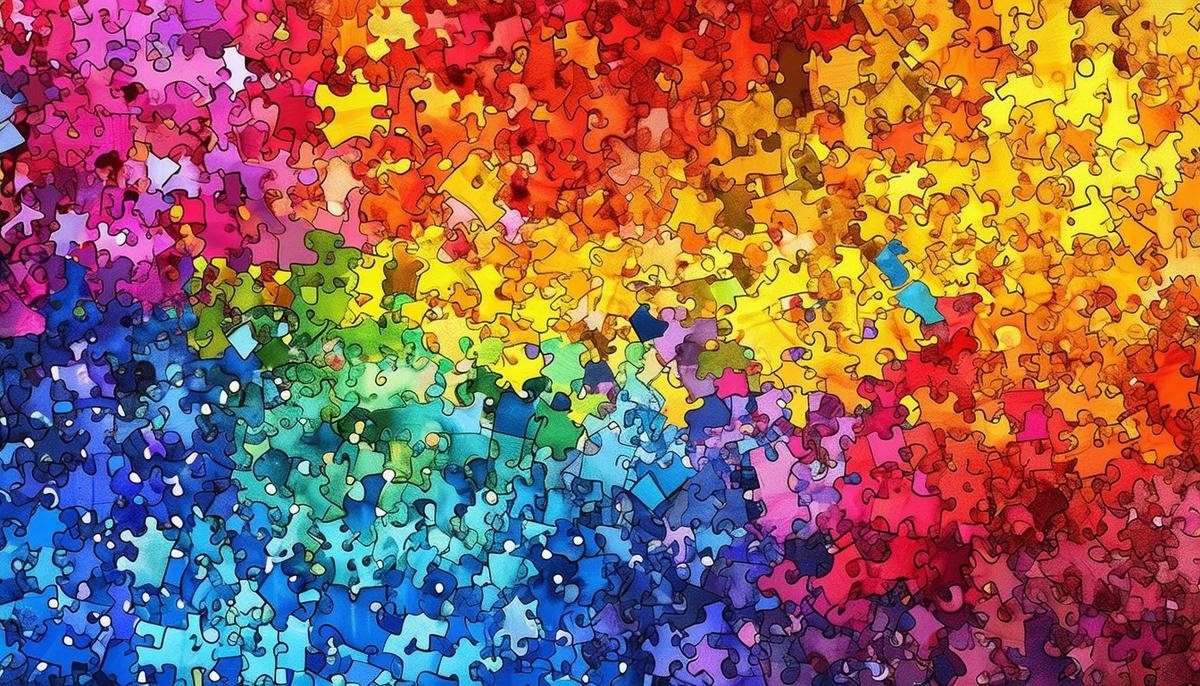
Autism, a rich labyrinth of experiences, challenges, and possibilities, is a nuanced, often misunderstood aspect of human diversity. With an increase in scientific understanding and research, our knowledge and comprehension of autism has advanced significantly. Entering 2023, we find ourselves in a unique position to delve further into understanding autism spectrum disorders – their intricacies, the experiences of those living with them, and the opportunities for support and advancement. Herein, we explore the definition and types of autism, underscore the challenges faced by families, investigate effective support strategies, and unwrap the latest advancements and resources available. Furthermore, we delve into creating an empathetic, nurturing family environment crucial for the growth and development of autistic individuals.
What is Autism?
Autism 2023: A Glimpse at Upcoming Developments and Understanding for Families
Creating a loving, nurturing and understanding environment for every family member is at the heart of every parent’s goal. When it comes to caring for children on the autism spectrum, this falls into sharp focus. As we anticipate the coming year, parents and families impacted by autism have every reason to be hopeful. Let’s unravel what 2023 will bring to the forefront in terms of advancements and understanding of autism.
To begin with, there’s exciting news on the technology front. Assistive technology is revolutionizing the way we understand and communicate with those on the autism spectrum. Expect to witness more sophisticated and user-friendly apps and gadgets in 2023. These will aim to facilitate improved communication, social interaction, and learning opportunities for those with autism, making daily life and education more enriching and accessible.
Research is key in battling any health or mental challenge. In 2023, expect vast strides in this area. As we continue advancing and refining our understanding of autism’s genetic underpinnings, there will be increased exploration into individualized treatment methods. This will move us further away from a “one size fits all” approach and will optimise medical responses to the unique needs of each individual on the autism spectrum.
Education and societal awareness will continue gaining momentum in 2023. Schools and other educational institutions are becoming more and more prepared to accommodate students on the autism spectrum. Tailored educational strategies and a commitment to creating diverse, inclusive environments are coming into sharp focus. Professional development opportunities geared toward equipping educators with knowledge and tools to support autistic students are on the rise, which signals a brighter future for inclusive education.
Furthermore, expect to see the theme of autism acceptance, versus mere awareness, amplified in nationwide campaigns come 2023. A growing shift in the public perception of autism from a ‘deficit’ view to a ‘difference’ view signifies progress in the right direction. Media representation and story-telling play a large role here – anticipate seeing autism depicted more accurately and respectfully in films, books, and television.
Now, not every development may directly pertain to parents or caregivers, but awareness of these changes could provide valuable insight and generate constructive discussions with health care providers, educators, and extended family members.
Despite the challenges, families touched by autism hold a beautiful resiliency. As advancing technologies and treatments, educational opportunities, and shifts in societal perception continue to unfold in 2023, families can expect to see an environment ever more responsive, understanding, and supportive to the needs of their loved ones on the autism spectrum.
The future is bright, and each development brings us one step closer to a world more understanding and accepting of autism. After all, it’s those unique colors in our family life’s tapestry that make it even more heartwarming and beautiful, and embracing them brings us closer to a harmonious, accepting society.

Experiences and Challenges
Experiencing Life with Autism: The Journey Begins in 2023
In the ever-evolving landscape of autism, various unique experiences and challenges are expected to unfold for families in 2023. New trajectories in the realm of autism will open up avenues that have been previously uncharted, yielding both fresh highs and testing hurdles for families navigating this journey.
An emerging trend is the remarkable rise of neurodiversity movements, advocating for a broader understanding of neurological differences, such as autism. This phenomenon gives parents new perspectives to consider – seeing autism not as a disorder to be cured, but as a part of their child’s identity. It allows for a discarding of old stigmas and an embracing of individuality, but it also presents challenges. Parents may struggle to balance support for their child’s uniqueness with the need for them to adapt to societal norms and expectations.
Furthermore, as inclusivity becomes more mainstream, opportunities and incentives for autistic individuals in sports and arts become prominent. These developments enable autistic children to express themselves, develop social connections and discover their potentials in ways that were not previously available. However, these opportunities may also present challenges, as these environments may not always be adequately equipped or understanding to accommodate autistic individuals. Parents must advocate for their children aggressively to ensure they’re receiving the services and accommodations they require.
Another emerging aspect projected for 2023 is the rise of online communities and availability of resources for autistic families. The internet becomes an oasis for parents seeking guidance and comfort. Peer groups offer emotional and practical support, and professional platforms provide valuable insights and advice on autism. The challenge here, however, is effectively navigating the oversaturation of information, and the difficulty of determining accurate, scientific information from misinformation.
Moreover, advancements in telehealth services promise to bring essential therapeutic resources right into homes, a beneficial development for families located in regions where professionals specializing in autism are scarce. But, the reliance on virtual consultations also compounds issues of access and efficacy. Poor internet connectivity and lack of personal interaction may result in an inadequate understanding of the child’s needs, further demonstrating the double-edged sword of advancement and accessibility.
Given these transformations in the landscape, navigating the intersection of family life and autism may certainly present its set of challenges in 2023, but they will undoubtedly be intertwined with moments of unique joy and unanticipated victories. As we move forward, let us remind ourselves of the importance of celebrating the milestones, cherishing the growth, and appreciating the resilience of these spirited, remarkable children and their tenacious families. Through these moments of struggle and triumph, we continue to weave the strenuous, yet rewarding tapestry of autism – a rich narrative of persistence, adaptation, and unconditional love.

Strategies for Support
Effective Strategies to Empower Your Child with Autism in 2023
As the world is becoming increasingly understanding and accepting of people with autism, there’s never been a better time to employ a proactive approach to fostering growth and independent living for your child with autism. A range of strategies have emerged that offer great promise, whether you are supporting your child at home or advocating for them within your community.
Inclusive and Adaptive Strategies
Firstly, home is the primary environment where a child grows and learns; therefore, creating an autism-friendly home space is more than crucial. Adapt the household environment to your child’s unique needs. This can include creating quiet spaces for downtime, using visual cues to aid communication or setting predictable routines to help children with autism understand what’s coming next, reducing anxiety.
In 2023, there’s a notable trend of employing inclusive strategies in both sporting and artistic spaces. For children with autism who can sometimes struggle with social connection, inclusive activities like Special Olympics and art therapy classes can be incredibly beneficial. Inclusivity in the broader community not only aids a child’s development but fosters an enriched sense of belonging and acceptance.
Utilizing Online Resources and Telehealth Services
The digital age has brought about a proliferation of online communities and resources for families affected by autism. From discussion groups to webinars, there’s a wealth of knowledge and support at your fingertips. Parents can join support groups online to share experiences, learn from others and gather trusted information to dispel myths about autism.
Telehealth services, which saw a rise during the pandemic, remain a lifeline for families. These services offer at-home therapy, educational support, and medical consultations. When choosing a telehealth provider, ensure they’re certified and have experience working specifically with individuals with autism.
Maintaining Open Communication and Celebrating Milestones
Keeping open lines of communication is paramount for supporting an autistic child. Have meaningful conversations with educators, coaches, and healthcare providers to ensure they know your child’s triggers, interests, and coping mechanisms. This understanding will help them provide a genuinely inclusive environment for your child.
Lastly, remember to celebrate both big and small wins. Whether it’s mastering a new skill or completing a task independently, acknowledging these achievements encourages resilience and self-confidence. Family life with autism can certainly present challenges, but it’s equally filled with unique joys and milestones. The key lies in embracing neurodiversity and continually striving to create a more inclusive and understanding world for our children.

Advancements and Resources
Looking ahead to 2023, expect to see a continued evolution in our understanding of autism, the support and resources available, and the ways society embraces neurodiversity. This article aims to shed light on new developments and resources families should look out for, adding to an existing discussion that includes breakthroughs in technology, research, educational environments, and cultural perception.
In recent years, there has been a significant surge in app development that caters to the needs of individuals with autism. These apps help improve communication, social skills, and behavior management while providing an avenue for self-expression. With the rise of artificial intelligence, we can anticipate even more sophisticated tools that can adjust and grow with the user’s specific needs.
When it comes to research, advancements in brain imaging studies promise a deeper understanding of autism. By unveiling the neurological differences in the autistic brain, these studies can contribute to the development of more effective therapies and interventions, fostering higher independence levels.
Moreover, it’s vital to highlight the transformation in autism-related legislation. Support for advocacy efforts by autism-support groups has led to significant policy changes aimed at promoting equality and inclusivity. Families should look for continued progress in this area, which will ensure stronger protective laws and increased accommodation for individuals with autism.
Looking beyond academics, it’s crucial to ensure that individuals with autism can enjoy hobbies and extracurricular activities. Therefore, training programs for coaches and teachers will be on the rise, helping them adopt a more inclusive approach in sports and arts.
Furthermore, there are expected advancements in telehealth options that specialize in autism therapy. These resources will be of great value for busy families, those living in remote areas, or amidst ongoing concerns with the covid-19 pandemic.
Now, while there is a wealth of information available online, it’s essential for families to know where to find legitimate resources. More online platforms are working to streamline information and ensure it comes from reliable sources. Make sure to keep an eye out for websites that vet their resources and provide guidance on how to interpret various pieces of information.
Embracing the challenges and joys of navigating family life with autism is a shared journey. Let’s continue to celebrate the brilliance of our loved ones, rejoice in their achievements, and participate in creating an inclusive community that cherishes neurodiversity. Together, we are making strides towards a bright future for our loved ones with autism.

Fostering an Understanding Family Environment
As families in 2023, navigating the world of autism might seem a descent into unfamiliar territory. But fear not, dear readers, because society is paving the way with the spread of acceptance, in-depth research, and countless resources to support our precious children. But how can we, as families, further contribute to this nurturing and understanding environment for our autistic loved ones?
Creating an understanding environment starts at home. Remember to always appreciate and respect the uniqueness of an autistic child. The key is in understanding that autism isn’t a disability to cure, but a different way of experiencing the world. Tailor your home to their needs: opt for calming paint colors, incorporate sensory-friendly furniture, and consider a quiet sanctuary where they can retreat from sensory overload whenever necessary.
Just because your child has autism, doesn’t mean they can’t partake in hobbies and extracurricular activities like any other child. Sports, arts, and music are some of just many platforms where they can express themselves, explore their talents, and improve their social skills. Make certain any clubs or groups they join promote inclusivity and are open to making adjustments to facilitate their participation.
In our digital age, online communities and resources have become our comrades. From platforms sharing therapeutic activities to forums for parents to share their stories, the Internet is fertile ground for support and knowledge about autism. However, stay vigilant about verifying the information you encounter. A practice we recommend is confirming any shared advice or facts with reputable organizations or professionals in the field.
Speaking of professionals, the rise of telehealth services shouldn’t be overlooked. These services can make regular consultations much more accessible, particularly for those living in more isolated areas. That said, it’s still crucial to have face-to-face interaction when possible, as non-verbal cues and physical symptoms can sometimes be critical in evaluating an autistic child’s condition and progress.
Education is as essential as ever. Open communication with teachers can lead to personalized education plans that better cater to the learning style and pace of an autistic child. A strong partnership among parents, educators, and special education professionals can go a long way in ensuring your child’s academic success and social growth.
Every step forward, no matter how small, is a victory to be celebrated. Acknowledging milestones – seen in a new word spoken, a friendship formed, or a tantrum managed – helps highlight progression and can be a heartwarming motivation for both the child and caregivers.
As families, we can push for and mold a more inclusive community. Be unafraid to share your experiences and educate people about autism to help challenge misconceptions and ignite understanding. The stronger our advocacy, the louder our call for acceptance and support.
When it comes to embracing and promoting neurodiversity, it’s not a sprint but a marathon. This undertaking may be not without its challenges, but armed with knowledge, patience, and love, we can foster an environment where autistic individuals can thrive and bloom in all their brilliance. Here’s hoping this sparks more conversation and ignites action as we continue to navigate the treasures of parenthood together.

As we navigate through the landscape of autism, the importance of a comprehensive understanding becomes increasingly clear. It is through acknowledging the reality of these experiences, fostering supportive environments, and leveraging the latest developments that we can uplift and empower those within the autism spectrum. Efforts spent now will translate into a transformed world for autistic individuals and their families, making 2023 a pivotal year in this journey. With deeper research, shared experiences, and targeted support strategies, we move towards manifesting a future where every individual, regardless of their neurological wiring, can reach their full potential in an understanding, inclusive society.




